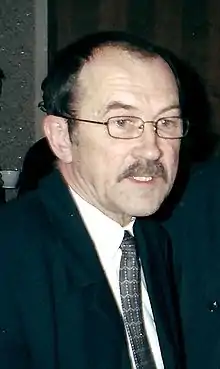Romualdas Ozolas
Romualdas Ozolas [rɔmʊˈɐɫdɐs ˈoːzɔɫɐs] (31 January 1939 – 6 April 2015)[1] was a Lithuanian politician, activist, writer and pedagogue who taught at Vilnius University.[2] He was a member of the Lithuanian branch of the Communist Party of the Soviet Union from 1973 to 1989,[2] and a member of the Lithuanian independence movement, Sąjūdis from 1988 to 1990.[2] In 1988, he founded the cultural Vilnija organisation. From 1990 to 1991 he served as Deputy Prime Minister of Lithuania together with Algirdas Brazauskas. He joined the Lithuanian Centre Union in 1993 and was its chairman until 2000.[2] In 1996, he was elected to the Seimas and served until 2000.[2] From 2003 to 2007 he chaired the National Centre Party (NCP), since renamed the Lithuanian Centre Party (LCP) in 2005. He was a winner of the Stasys Šalkauskis prize.[2]
Romualdas Ozolas | |
|---|---|
 | |
| Deputy Prime Minister of the Republic of Lithuania | |
| In office 17 March 1990 – 10 January 1991 | |
| Member of the Seimas | |
| In office 25 November 1991 – 18 October 2000 | |
| Preceded by | Česlovas Juršėnas |
| Succeeded by | Artūras Paulauskas |
| Personal details | |
| Born | 31 January 1939 Joniškėlis, Lithuania |
| Died | 6 April 2015 (aged 76) Vilnius, Lithuania |
| Political party | Sąjūdis (1988–1990) Lithuanian Centre Union (1990-2003) Lithuanian Centre Party (2003-2015) |
| Spouse(s) | Irena Ozolienė |
| Alma mater | Vilnius University (1962) |
Political career
After a long while of hesitation, I have made up my mind to see "what makes socialism". After a few years it was absolutely clear. It took me two more years until I left. However, I have faced the Perestroika of Mikhail Gorbachev, thus finding out its being as well as its mode of life. I only needed to take a look around, to see from which side I should make an approach.
—Ozolas on his years as the member of the Communist Party of Lithuania
Member of the Lithuanian Communist Party: 1973–1990
Ozolas became a member of the Lithuanian Communist Party of the Soviet Union at the age of 34, a decision his close ones would deem as betrayal while he later on would recall as one of his greatest downfalls in his life.[3]
Member of Sąjūdis: 1988–1990
Ozolas had a clear vision for Lithuania, which was an independent state and a free nation from the very start. According to the political commentator A. Ramonaitė, at the primary stages of Sąjūdis Ozolas was a key member of Sąjūdis that glued things together. He was well-known, had ties with various discussion groups, and had a well-grounded political vision.[3] To quote his companion Arvydas Juozaitis, "We were all gathering under the flag of Ozolas who worked for the publishing office Thought at the time. I had participated in the discussions at his flat since 1982. I knew him very well. It was he who began talking about the necessity of creating, gathering into a movement for the independence."[3]
Political views
Ozolas was against Lithuania's membership in the European Union as he believed this was incompatible with the country's vision of independence. According to Darius Kuolys, "R. Ozolas was a consistent supporter of the country's unlimited freedom all the way who had a hard time surviving the partial loss of Lithuania's independence within the European Union. He understood this as a strong restraint of Lithuania's sovereignty."[4] He was also against the idea of Lithuania joining the eurozone.[3] In 2013, during an interview he had noted the differences between the original vision of Sąjūdis and the present situation, saying: "Back then [in the 1990s] we had different values. Back then we were heading towards an independent national country. Today we are once more integrating into an international union. As a consequence, it is self-evident that the values of the state have to be reshaped and that is exactly what was being done during the process of Lithuania becoming a member of the EU."[5]
Works
- Stories about Philosophers and Philosophy (1988)
- The First Years of Re-established Independence (1992)
- Within the Sources of Rebirth (1996)
References
- "Mirė buvęs Seimo narys, signataras Romualdas Ozolas". lrytas.lt. 6 April 2015. Archived from the original on 8 April 2015.
- Romualdas OZOLAS, bio on the pages of Lithuanian parliament
- "Žmogus, turėjęs užimti Landsbergio vietą: didžiausias gyvenimo nuopuolis ir mįslinga sūnaus mirtis (in Lithuanian)". Delfi.
- "Lietuvos laisvės projektą kūręs Romualdas Ozolas po mirties sulaukė smūgio – buvo paniekintas (in Lithuanian)". TV3. 6 March 2020.
- "Sąjūdžiui 25-eri. R. Ozolas. Kelio atgal nėra! 0 į priekį, į savarankiškumą - jis be pabaigos! (in Lithuanian)". LRT.